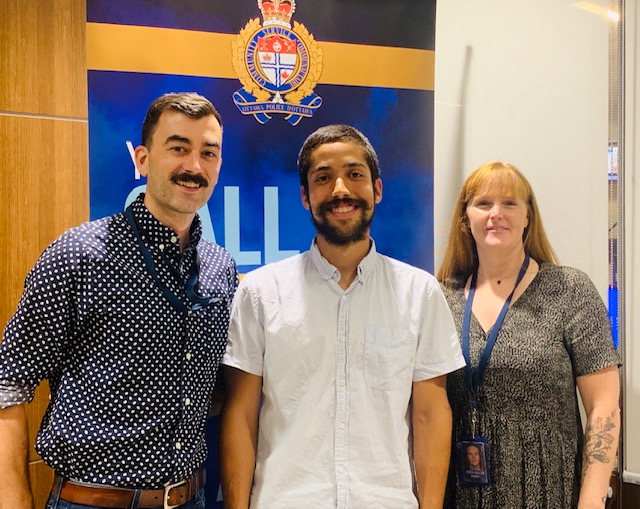LAST month, Ottawa Fire Services Sector Chief Bill Bell saved a woman after her car landed in the Ottawa River and she was unable to escape. In the fifteen minutes leading up to her rescue, Ottawa Police 911 Communications staff tried to locate the woman so they could send help, while racing against time as her car filled with water. This is that story.
OPS Communications clerk Victor Fuenmayor answered the call transferred from MRC des Collines at about 12:15 a.m. on June 21. A woman said, “Please help me.”
“What’s wrong?” he asked.
“My car is in the water and I can’t open the door.”
His heart raced, but this is what Victor is trained to do. “I gather information from callers so we can send the help they need,” he said, “and I stay with them, trying to keep them calm, until help arrives.”
In the 18 months he’s worked in the Communications Centre, he’s never received a call where someone was trapped in a car filling with water.
“Where are you?” he asked.
The woman said she didn’t know, as she’s not from Ottawa.
When a call comes into 911, it’s possible to use GPS to triangulate the position of the caller. Because the call was transferred, this wasn’t an option.
Victor asked what road she was driving on when she went in the water, but she couldn’t remember. “I prodded her for any detail, a street name she could remember, what body of water she was in or if she could see any landmarks that would tell me where she was.”
“All I see is water,” she answered. The water inside the car was up to her waist.
After about four minutes, she remembered the name of the street: Thomas A Dolan Parkway.
“I know where you are,” said Victor, who also received an update from MRC des Collines confirming her location. “Help will be there soon.”
The woman remained calm. “Please hurry,” she said. The water had risen to chest level. “The water is cold.”
Victor signaled other Communications staff for help, so now he had his supervisor and the call dispatcher with him. Together, they tried to think of ways the woman could free herself, since the doors would not open.
“Do you have anything sharp in the vehicle?” he asked her.
The car was a rental car she picked up that day and she wasn’t familiar with the equipment.
“Can you remove the head-rest?” Victor asked. He explained she could use the steel posts to strike the window. The woman was unable to pull the head-rest off the seat.
“Does the car have a sun roof?”
“I wish it did,” answered the woman.
“Try the seat belt buckle,” Victor told her. He heard the sound of the buckle hitting the window, but it didn’t break.
The water kept rising. “How high is the water now?” he asked.
“Up to my shoulders.”
“The water outside the car, is it over the roof?”
“No, not yet.”
“That’s good,” he told her. “It means the car won’t fill up completely.”
Victor assured her help would be there soon. The woman advised the water level was past her shoulders.
He asked if the car lights were still on, so emergency responders could see her when they arrive. They were.
The call became even more critical when the woman advised him the water outside the car was now above the window. He told her to try to open the door again. It still wouldn’t budge.
“How much room do you have?” he asked, referring to the water level.
“Not much,” she said. “Tell them to hurry. Please.”
“We have someone there and they see you,” he told her. “Just remain calm.”
When he didn’t get a response, Victor asked, “Hello? Can you hear me?”
The line went dead.
“I assumed her phone fell in the water. I knew we were right there, but did we make it in time? It was so close and now I didn’t know what was going on.”
“My adrenaline was running high and when the call dropped, I was panicking inside. I felt responsible for this woman’s safety.”
For two agonizing minutes he waited, before he received word she was okay. The woman was cold but uninjured and being taken to the hospital as a precaution.
Victor calls this the most intense call he’s been on ‘by far’.
“Most situations I deal with already have an outcome, like a collision. In this case, a life and death situation was unfolding in front of me and the outcome depended largely on my actions,” he said. “I wouldn’t have been able to stay calm without the support of my supervisor and dispatcher. It was a team effort from start to finish.”
Police recommend vehicle owners keep a glass-breaking tool on a keychain so you have it handy to get in or out of the vehicle in emergency.











